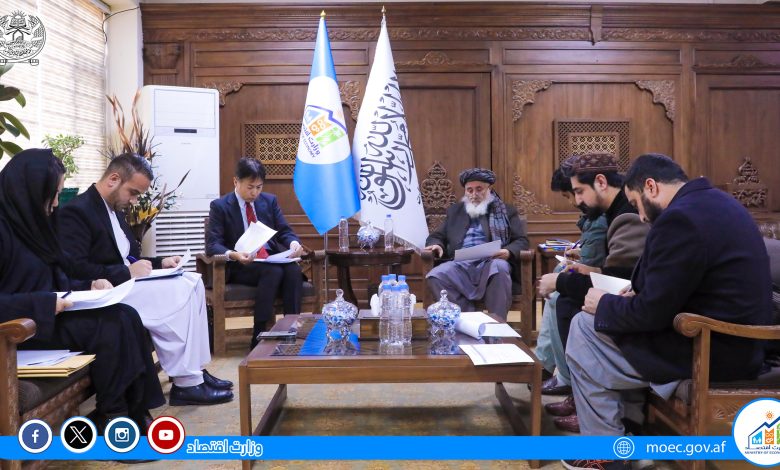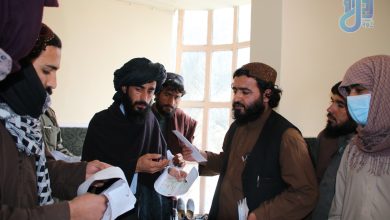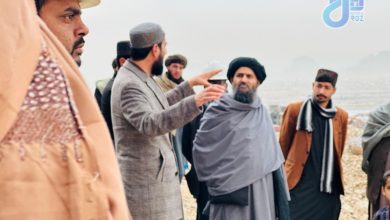Analytical Report: Economic Cooperation and Humanitarian Aid between Afghanistan and Japan

Weezha Roz-In a significant diplomatic move, the Minister of Economy of Afghanistan, Mr. Din Mohammad “Hanif,” met with the Ambassador of Japan to Afghanistan, Mr.Takayoshi Koromaya.
The meeting, which focused on enhancing economic cooperation and the continuation of humanitarian assistance, comes at a critical time for Afghanistan, as it seeks both economic stability and relief for its citizens, particularly those affected by conflict and natural disasters.
Key Points from the Meeting:
1.Humanitarian Aid and Its Impact:
Ambassador Koromaya shared details about Japan’s humanitarian contribution for the year 2024, which totals approximately USD 27.4 million.
This aid is being implemented through various United Nations agencies across multiple sectors.
The sectors include healthcare, education, and efforts against drug abuse, reflecting Japan’s long-standing commitment to supporting Afghanistan in areas of urgent need.
2.Commitment for Future Assistance (2025):
Looking forward, Japan has pledged to continue its humanitarian and developmental assistance in 2025.
The areas of focus for this future support will be:
Healthcare and education
Counter-narcotics- Alternative livelihoods
Water management
Climate change adaptation
Addressing the issues faced by internally displaced persons (IDPs) and returnees
This promise reflects Japan’s strategic and enduring partnership with Afghanistan, underscoring its role not only as a humanitarian supporter but also as a key development partner.
3.Afghanistan’s Focus on Balanced Development:
The Afghan Minister of Economy, Mr. Hanif, expressed his gratitude for Japan’s humanitarian assistance, particularly for the returnees and those affected by natural disasters.
However, he also highlighted the need to shift focus towards more sustainable development aid, which can address the root causes of Afghanistan’s socio-economic struggles.
He specifically emphasized the importance of fostering balanced development across various sectors, which could lead to the creation of job opportunities, thus improving livelihoods and supporting household economies.
Minister Hanif’s comments point to Afghanistan’s desire to move beyond immediate relief efforts and work towards long-term economic stability. By focusing on infrastructure, sustainable livelihoods, and economic growth, Afghanistan aims to reduce its reliance on foreign aid and create self-sustaining communities.
Analysis and Implications:
The meeting between Minister Hanif and Ambassador Koromaya illustrates a critical phase in the evolving relationship between Afghanistan and Japan.
It highlights the continued importance of Japan as a major donor and development partner for Afghanistan.
As the country faces numerous challenges, including political instability, security concerns, and economic fragility, Japan’s assistance is pivotal in addressing humanitarian needs while also supporting longer-term developmental goals.
The call for “balanced development” by the Afghan government is significant. It signals a desire to diversify the economy and create opportunities that empower local communities.
Japan’s pledge for continued support in key sectors, including climate change, water management, and education, aligns well with Afghanistan’s broader goals for self-sufficiency and sustainable development.
Additionally, the focus on internally displaced persons (IDPs) and returnees highlights Afghanistan’s ongoing struggle with displacement, a critical issue given the number of people forced to flee their homes due to conflict and natural disasters.
Japan’s commitment to addressing these challenges is not just a moral obligation but also a strategic necessity, as stabilizing Afghanistan’s population is crucial for the overall stability of the region.
Conclusion:
The meeting between Afghanistan’s Minister of Economy and Japan’s Ambassador serves as a reminder of the complex and multifaceted support Afghanistan needs.
While Japan’s humanitarian aid continues to play an essential role, the Afghan government’s emphasis on developing a more self-sustaining economy represents a crucial shift towards long-term recovery.
Japan’s ongoing commitment to providing aid and its support for Afghanistan’s developmental aspirations are vital in helping the country navigate its difficult challenges and build a more resilient future.
This diplomatic engagement highlights the importance of international cooperation and the need for continued partnerships to address the humanitarian, economic, and environmental challenges that Afghanistan faces.
The collaboration between Japan and Afghanistan remains an essential pillar in the country’s journey toward stability and prosperity.
Weezha Roz




